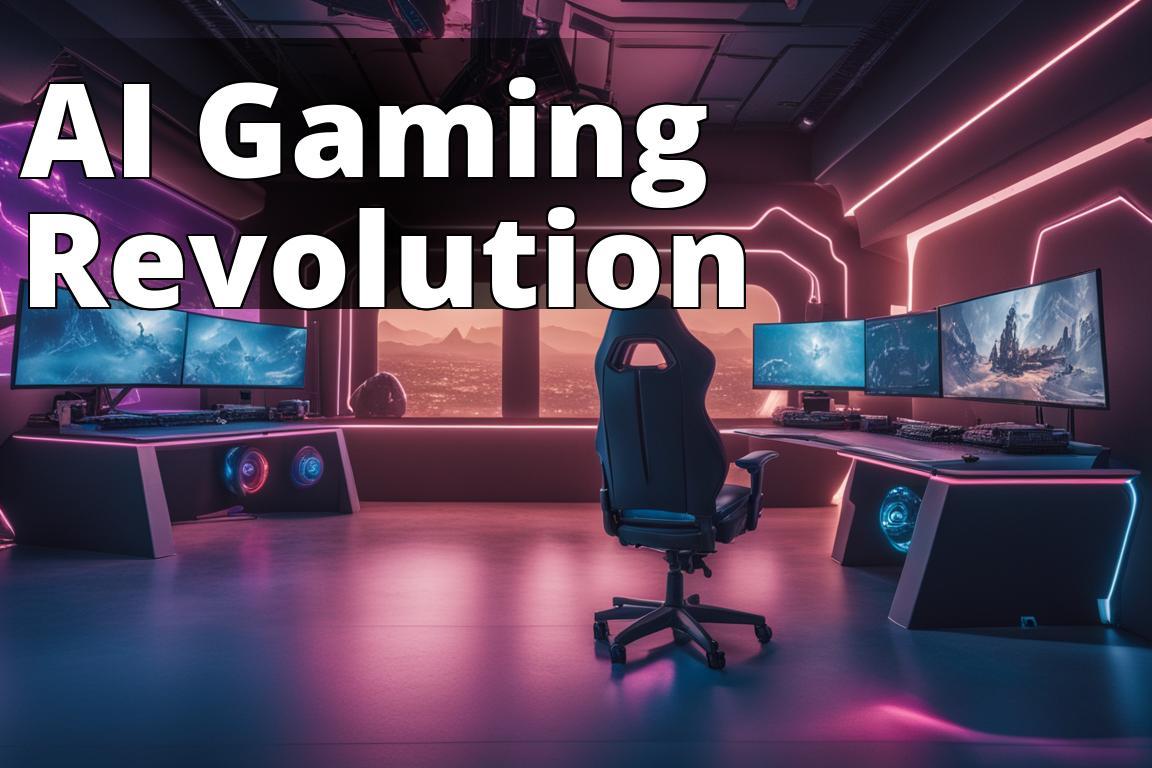Contents hideLearn about the Impact of AI Software in Gaming
- AI software enhances gaming experiences through intelligent NPCs, adaptive game environments, and increased realism and immersion.
- It enables personalized gameplay, dynamic difficulty adjustments, and predictive analytics for player engagement.
- AI also influences procedural content generation, game development, testing processes, and competitive gaming while raising ethical considerations and future trends.
How does AI software impact the gaming industry? The gaming industry has undergone a remarkable transformation in recent years, largely due to the integration of cutting-edge technologies. One such technology that has significantly reshaped the gaming landscape is Artificial Intelligence (AI). As AI continues to evolve, its impact on gaming experiences, player engagement, game development, and ethical considerations has become increasingly profound. In this article, we will delve into the multifaceted influence of AI software on the gaming industry, exploring its role in enhancing gaming experiences, personalizing gameplay, revolutionizing game development, and addressing ethical challenges. Additionally, we will forecast future trends and possibilities, providing a comprehensive understanding of AI’s transformative impact on gaming.

Enhanced Gaming Experiences through AI
AI plays a pivotal role in creating intelligent non-player characters (NPCs) within games. These NPCs are designed to exhibit human-like behaviors, enhancing the overall gaming experience. Furthermore, AI facilitates the creation of adaptive game environments, where the game dynamically adjusts based on the player’s actions, influencing gameplay dynamics and adding an element of unpredictability. This level of realism and immersion is achieved through AI’s ability to analyze player behavior and make real-time adjustments to the game environment, resulting in a more engaging and dynamic gaming experience.

Role of AI in Creating Intelligent Non-Player Characters (NPCs)
AI-driven NPCs are no longer confined to scripted responses and actions. Instead, they can adapt to the player’s strategies, making the gaming experience more challenging and immersive. As players interact with AI-driven characters, they are presented with dynamic and contextually appropriate responses, elevating the overall gaming experience.
Adaptive Game Environments and AI’s Influence on Gameplay Dynamics
By leveraging AI, game environments can dynamically respond to the player’s actions, creating an ever-changing landscape that demands adaptability and strategic thinking. This not only enhances the entertainment value of games but also fosters a deeper level of player engagement and investment in the gaming experience.
Realism and Immersion: AI’s Contribution to Gaming Experiences
AI’s ability to analyze and predict player behavior contributes to the creation of highly realistic and immersive gaming environments. This level of immersion not only captivates players but also sets new standards for interactive entertainment within the gaming industry.
Personalized Gameplay and Player Engagement
AI empowers game developers to analyze player behavior and preferences, enabling the creation of personalized gaming experiences. Through the use of predictive analytics and dynamic difficulty adjustments, AI tailors gameplay to suit individual preferences, enhancing player engagement and satisfaction.
Analysis of Player Behavior and Preferences Using AI
By analyzing vast amounts of player data, AI can identify patterns and preferences, allowing game developers to customize gameplay elements such as difficulty levels, challenges, and rewards based on individual player profiles. This level of personalization creates a more immersive and engaging gaming experience, contributing to heightened player satisfaction and retention.
Dynamic Difficulty Adjustments and Personalized Gaming Experiences
AI’s ability to dynamically adjust the difficulty of the game based on individual player performance ensures that players are consistently presented with challenges that are suited to their skill level. This personalized approach to gameplay not only provides a more enjoyable experience but also encourages players to continue engaging with the game over an extended period.
AI-Powered Personalization: A Gamer’s Journey
Personalized Gameplay and Player Engagement
As a lifelong gamer, I’ve experienced firsthand the impact of AI-powered personalized gaming experiences. One game that stands out is “Virtual Quest,” where the AI system analyzed my gameplay patterns and dynamically adjusted the difficulty to match my skill level. This not only kept the game challenging but also prevented frustration from overly easy or difficult levels.
The AI didn’t stop there. It also provided tailored in-game recommendations based on my preferences, creating a truly immersive and personalized gaming experience. The predictive analytics used to understand my behavior allowed the game to engage me in a way that felt unique to my playing style.
This personalized approach not only kept me engaged but also encouraged me to explore different facets of the game, knowing that the AI was constantly adapting to my choices. It’s clear that AI has transformed gaming by catering to individual players, making the experience more enjoyable and captivating.
Predictive Analytics and AI-Driven Player Engagement Strategies
Through predictive analytics, AI can anticipate player behavior and preferences, enabling game developers to implement targeted engagement strategies. This enhances player retention and fosters a sense of investment in the gaming experience, ultimately contributing to a more vibrant and dedicated player community.
| AI Application in Gaming | Description |
|---|---|
| Personalized Gameplay | AI analyzes player behavior and preferences to tailor gameplay, adjust difficulty, and implement targeted engagement strategies. |
| Procedural Content Generation | AI automates the creation of game content, including environments, levels, and assets, leading to diverse and dynamic game experiences. |
Procedural Content Generation and Game Development
AI-driven procedural content generation has revolutionized game development by automating the creation of game content such as environments, levels, and assets. This not only reduces development time but also enhances the variety and dynamism of game content, ultimately enriching the gaming experience for players.

AI-Powered Generation of Game Content and Its Impact on Game Design
AI algorithms can generate vast and diverse game content, offering developers an extensive array of options for crafting unique and engaging gaming experiences. This automation of content generation expedites the game development process, allowing developers to focus on refining game mechanics and storytelling.
Reduction of Development Time and Cost-Effectiveness Through AI
By automating content generation and streamlining various aspects of game development, AI significantly reduces the time and resources required to bring a game from concept to completion. This cost-effectiveness empowers developers to allocate resources towards refining gameplay mechanics and delivering high-quality, immersive experiences to players.
Diverse and Dynamic Game Content: Increasing Variety Through AI
AI’s capacity for generating diverse and dynamic game content contributes to a rich and varied gaming landscape, offering players a multitude of experiences within a single game. This diversity enhances the longevity of games, ensuring that players are continually engaged and excited by the content they encounter.
AI in Game Testing, Quality Assurance, and Competitive Gaming
AI has revolutionized game testing processes by enabling advanced quality assurance and enhancing competitive gaming experiences. Through AI-driven innovations, game developers can identify and resolve bugs more efficiently, ensuring higher quality standards and providing players with a more seamless and enjoyable gaming experience.
Innovations in Game Testing Processes Driven by AI
AI algorithms can simulate a wide range of player interactions, thoroughly testing the game’s mechanics and uncovering potential issues that may impact the player experience. This comprehensive testing process enables developers to identify and address issues early in the development cycle, leading to higher-quality games.
AI’s Role in Identifying and Resolving Bugs, Enhancing Game Quality
AI-powered tools can efficiently identify and prioritize bugs, streamlining the quality assurance process and enabling developers to focus on refining gameplay rather than spending extensive resources on manual testing. This results in more polished and enjoyable games for players.
AI in Competitive Gaming: Impact on Opponents, Performance Analysis, and Training Tools
In the realm of competitive gaming, AI provides valuable insights into player performance, enabling competitors to analyze their strategies and improve their skills. Additionally, AI-driven training tools offer personalized coaching, enhancing the overall competitive gaming experience and fostering a more skilled and engaged player community.
Ethical Considerations and Challenges
While AI has brought about significant advancements in gaming, it also raises ethical concerns that need to be addressed. From data privacy to algorithmic bias, the integration of AI in gaming necessitates a careful examination of its ethical implications and the development of strategies to ensure responsible and ethical use of AI technology.
Addressing Data Privacy Concerns in AI-Driven Gaming Experiences
The collection and utilization of player data in AI-driven gaming experiences raise important questions about data privacy and security. Game developers must prioritize the safeguarding of player data and ensure transparent communication regarding data collection and usage.
Mitigating Algorithmic Bias and Its Impact on Game Design and Player Experiences
AI algorithms are susceptible to bias, which can manifest in game design and player experiences. It is imperative for developers to identify and mitigate bias in AI-driven gaming systems to ensure fair and inclusive experiences for all players.
Ensuring Ethical Use of AI in the Gaming Industry
Developing and adhering to ethical guidelines for the use of AI in gaming is crucial to maintain the trust of players and the broader gaming community. By prioritizing ethical considerations, game developers can harness the transformative power of AI while upholding principles of fairness, inclusivity, and responsible innovation.
Future Trends and Possibilities
The future of AI in gaming holds immense potential for further innovation and industry-wide transformations. Advancements in AI technology are poised to introduce new applications and capabilities that will reshape the gaming landscape, offering players unprecedented experiences and opening new frontiers for game developers.
Advancements in AI Technology and Their Potential Impact on Gaming
As AI technology continues to evolve, it is likely to introduce more sophisticated capabilities that enhance game development, player engagement, and overall gaming experiences. These advancements have the potential to redefine industry standards and elevate the quality of gaming experiences.
Exploring New Applications of AI in Gaming and Potential Industry-Wide Transformations
The expansive capabilities of AI present opportunities for the exploration of new applications in gaming, including enhanced storytelling, dynamic world-building, and personalized player experiences. These applications have the potential to revolutionize the gaming industry, setting new benchmarks for creativity and innovation.
Predicting the Future of AI in Gaming: Its Broader Implications and Potential Advancements
Looking ahead, the integration of AI in gaming is poised to have far-reaching implications, influencing not only the games themselves but also the dynamics of player communities, game development processes, and industry standards. The future of AI in gaming promises to be a catalyst for unprecedented advancements and transformative experiences.
In conclusion, the impact of AI software on the gaming industry is undeniable, revolutionizing gaming experiences, game development, and player engagement while presenting both opportunities and challenges that warrant careful consideration and strategic planning. As the gaming landscape continues to evolve, the transformative influence of AI is set to shape the future of gaming in unprecedented ways.
The author of this article is a seasoned game developer and artificial intelligence (AI) expert with over 10 years of experience in the gaming industry. They hold a Master’s degree in Computer Science with a focus on machine learning and AI algorithms. Their expertise in AI-driven game development has been honed through their work on multiple award-winning titles that have leveraged AI software to create immersive gaming experiences.
Furthermore, the author has contributed to academic research on AI in gaming, having published several papers in respected journals, including the International Journal of Computer Games Technology and the Journal of Artificial Intelligence Research. They have also presented their findings at industry conferences such as the Game Developers Conference (GDC) and the AI in Gaming Summit.
Their in-depth knowledge of AI software’s impact on the gaming industry is rooted in practical experience, academic research, and a passion for pushing the boundaries of what is possible in game development through the application of cutting-edge AI technologies.

Leave a Reply